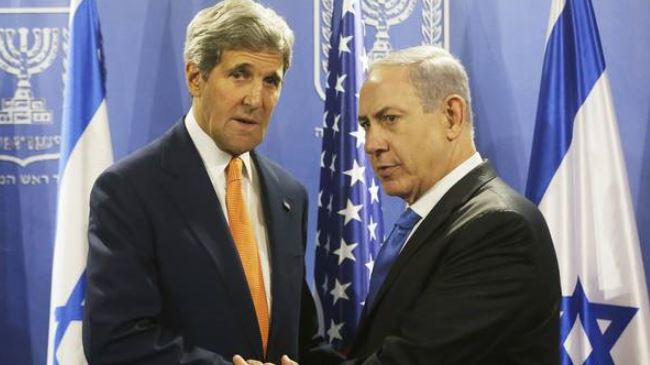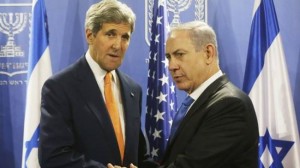US talks Gaza ceasefire, but resupplies munitions to Israel: Analyst

 Press TV has conducted an interview with Brian Becker, with the ANSWER Coalition, in Washington, about ceasefire discussions between Palestine and Israel as well as US-imposed mediator John Kerry’s impossible position.
Press TV has conducted an interview with Brian Becker, with the ANSWER Coalition, in Washington, about ceasefire discussions between Palestine and Israel as well as US-imposed mediator John Kerry’s impossible position.
The following is an approximate transcript of the interview.
Press TV: How do you feel about this talk of an unconditional ceasefire yet Israel wanting the right to attack the tunnels?
Becker: The US government led by John Kerry as the chief diplomat here has tried to carry out the impossible task of appearing to be mediator or an entity that’s trying to position itself between the two sides and come up with a peaceful solution, a truce or a ceasefire and at the same time write a blank cheque to the Israelis as they carry out merciless attacks against predominantly civilian targets.
The US government even in the last days was rushing missiles and bombs and bullets to the Israeli defense forces so they could be resupplied even at the very moment the Obama administration was issuing its first and I would say very tepid criticism of the Israeli attacks against civilians.
Kerry’s position is really an impossible one because it’s based on doublespeak. You can’t have a ceasefire and allow the Israelis to continue to carry out operations against the tunnels within Gaza – a country or area that has become an outdoor prison and where the people have no access to anything.
They have no control over their own borders or their own airspace or their own waterways. The tunnels in fact would be the only access out.
Because of Israeli policy for the past seven years you can’t have a ceasefire and say everything is frozen and at the same time say to the Israeli military to go ahead and continue some operations. A ceasefire would be a ceasefire.
I think the whole was a publicity stunt allowing the US government to try to position itself as a mediator at the same time as it is the indispensible nation for Israeli aggression.
And let’s not forget that if the United States were to take a decisive action; if it were to say we are cutting the four billion dollars that we give Israeli every year – and that’s just the tip of the iceberg – if they were to do that that would be a decisive significance in the Israeli calculations.
But that’s what the US government will not do.
Press TV: What exactly do you believe were the Israeli goals in this aggression in Gaza because many theories were put forth such as destroying the Palestinian Unity government; and others of course; and trying to completely disarm the resistance.
And secondly do you believe Israel will succeed in those goals?
Becker: Israeli wanted to crush the unity government. They were taken somewhat by surprise by it, as was the United States.
Hamas seemed to signify by its decision to form a unity government with the Palestinian authority and the formula being such that Hamas would no position of authority within the new unity government.
In other words Hamas was willing to make very big concessions on the basis of giving up governmental authority in exchange for the unity agreement. Even that became the trigger for the Israeli response.
So then, why do they fear that?
They fear that if the Palestine people in spite of the fractured state of political affairs are able to have some sort of unity and become a center of galvanizing or a magnet for international support then the Israelis would be facing a new consequence.
The Israeli project even though it seems omnipotent militarily; even though it’s the superpower militarily; even though it has Americans patron support and is in some ways an extension of American power, the Israelis know, the Zionist government knows the project is actually a fragile one.
A big part of the population is first and second generation immigrants. If things were to go badly for Israel many of them could go back to Brooklyn or back to Europe or go somewhere else and that the whole situation could change.
And if the United States government was ever to see Israel as a strategic liability rather than a strategic asset – which it has since 1967 – if they lost that support the unraveling of the Zionist project could become very dynamic.
So, Israel has to stay in a state of perpetual warfare against the Palestinians; disrupting any Palestinian unity and thus keeping the United States – which has this sort of automatic response whenever there is a military conflict to stand with Israel – to keep that relationship that strategic partnership alive and well.
So, it’s a long term proposition, they want to weaken Hamas. I agree with the other guest (Bob Ayres) they can never defeat Hamas or the idea of resistance. The Palestinian people exist as a people because of the concept of resistance; nor can they fully drive out the Palestinian people.
But they want to maintain the strategic status quo, which requires the disruption of Palestinian unity and the strategic partnership with the United States, which always kicks in at the time of military conflict.
Press TV: You mentioned strategic interests earlier, if you could expand on that and also respond to Mr. Ayres?
Becker: In 1956 the United States did not see Israel as an extension of American power in fact it was highly critical of and condemned the Israeli invasion into Suez – that was a British French Israeli project.
In 1967 when the US was bogged down in South East Asia unable to do or manage its affairs in the Middle East they constructed a new doctrine what was called later the ‘Nixon Doctrine’ using Iran, the Shah of Iran and Israel as the principle gendarmes – the props of America interest in the region.
Then there was the Iranian revolution and we know from the rest of the Middle East other revolutions can and will take place against monarchies and dictatorial and authoritarian governments. And they can, even if they are partners with the US, they can be dislodged by revolutions.
Israeli as a settler state is a constant dependency. It’s a client. And it was seen that way by the original founders of Zionism that some colonial patron had to be in the picture. Since 1967 that patron has been the United States.
Yes it is likely that the United States will maintain its relationship with Israel, but I disagree about the strength of enduring prospects for the Zionist project because the revolutions that have been failed in the last couple of years in Egypt and elsewhere don’t mean that the revolutions won’t keep happening.
In the United States in order to have a long term policy in the Middle East even for its own interests of empire may see at a certain point Israel as a strategy liability.
The American people are going through a seismic shift in their consciousness they are no longer looking at Israel as an absolute partner.
The Jewish American population – the younger parts of that population at least – no longer view Israel as a refuge for an endangered Jewish people, they see it as a privileged nations that’s carrying out war crimes. Even if they foundationally agree with Israel’s right to exist they disagree with the policies, the regular policies of the Netanyahu government and the increasingly right wing and racist character of Israeli society.
What happens in America can have a profound impact on the long term prospects for Israel – that’s the point that I’m trying to make.
Press TV: Our guest Mr. Ayers says even if we had a fair mediator and an agreement could struck he is not sure it could implement in a way that was reliable for both parties because of for example ‘hot heads’ on either side. How do you feel about that?
Becker: Hamas offered a ten year ceasefire. I think a real solution – not may be the mega-solution – but a solution at hand would be to lift the siege of Gaza. That’s not impossibility.
The siege was imposed – the almost eight year-long siege – not because of Hamas rocket attacks, but because the Palestinian people in their majority voted for the Hamas government I the election in 2007 and the Israelis and the American government supporting them decided to impose a siege. And that’s the issue right now, the blockade is the issue.
The Egyptian government is also hostile to Hamas obviously because of its previous connections to the Muslim Brotherhood and they have reinforced the siege as well.
But if the siege of Gaza were to lift, that would be a practical, palpable and realizable step that could lead to a change in the political situation.
The Israeli want to keep the siege on forever if they can, they’re just looking for pretext after pretext because they want to basically just wear down the Palestinians people in all places. That’s the real perspective it’s not peace it’s just endless war.
But there has to be other peoples in the world other governments in the world and a growing global grassroots movement that demands that the siege will be lifted.
Israel won’t bow to that, but Israel isn’t completely independent, it’s interdependent on its relationship with the United States and that’s where the power has to be directed towards – the global power.
Tomorrow in Washington DC – I’m not sure when we’re going to be broadcast – but on Saturday August 2nd tens of thousands of people in their biggest demonstration yet are going to be surrounding the white House demanding to cut all aid to Israel.
There is a sea change going on in terms of American public opinion.
Press TV: Mr. Ayers says both sides should give up something and both sides should gain something in a negotiated solution and that that’s implied. He asks what does Israel have to gain from a lifting of the siege. Your response.
Becker: What about the cessation of military conflict? Hamas has offered a ten year ceasefire. It’s a very minimal program it’s not complicated. Israel is imposing the siege the siege is not being imposed on Israel.
The incentive to the Israeli people is that military conflict would come to an end. Military conflict has escalated because of the siege.
Why do you need an impartial mediator? When the United States government sends Israel four billion dollars a year why can’t the US government say to Israel, theoretically, end the siege of Gaza or we’re going to cut aid. Wouldn’t that end the siege of Gaza? I think it would.







